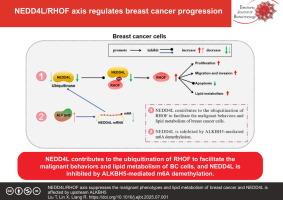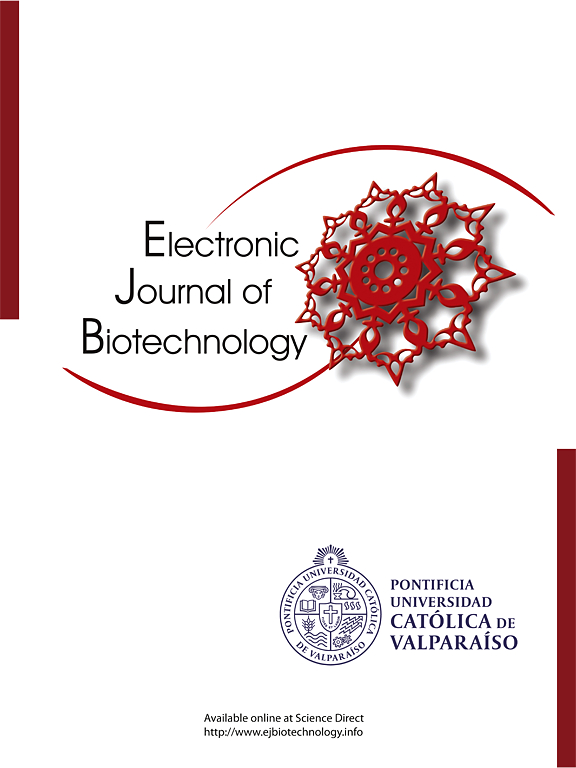NEDD4L/RHOF axis suppresses the malignant phenotypes and lipid metabolism of breast cancer and NEDD4L is affected by upstream ALKBH5
IF 2.5
4区 生物学
Q3 BIOTECHNOLOGY & APPLIED MICROBIOLOGY
引用次数: 0
Abstract
Background
The protein posttranslational modifications, including ubiquitination and methylation, exhibit the essential function in breast cancer. Herein, we aimed to explore the molecular mechanism of neural precursor cell-expressed developmentally downregulated gene 4-like (NEDD4L) associated with Rho GTPase Rif (RHOF) and AlkB homolog 5 (ALKBH5). A series of experiments including expression detection, cell functions, xenograft tumor assay, and interaction analysis was designed.
Results
RHOF was up-regulated in breast cancer samples and cells. Silencing RHOF suppressed breast cancer cell growth, migration, invasion and lipid metabolism. Breast cancer tumorigenesis and lipid metabolism were repressed by RHOF knockdown in vivo. NEDD4L impaired RHOF stability by promoting its ubiquitination. NEDD4L overexpression restrained breast cancer cell progression and lipid metabolism via degrading RHOF. ALKBH5 inhibited NEDD4L expression through m6A modification.
Conclusions
These results evidenced that NEDD4L facilitated the malignant progression of breast cancer via inducing the ubiquitination of RHOF, and NEDD4L was also affected by ALKBH5-mediated m6A demethylation.
How to cite: Liu T, Lin X, Liang R. NEDD4L/RHOF axis suppresses the malignant phenotypes and lipid metabolism of breast cancer and NEDD4L is affected by upstream ALKBH5. Electron J Biotechnol 2025;77. https://doi.org/10.1016/j.ejbt.2025.07.001.

NEDD4L/RHOF轴抑制乳腺癌的恶性表型和脂质代谢,NEDD4L受上游ALKBH5的影响
蛋白质的翻译后修饰,包括泛素化和甲基化,在乳腺癌中表现出重要的功能。本研究旨在探讨神经前体细胞表达与Rho GTPase Rif (RHOF)和AlkB同源物5 (ALKBH5)相关的发育下调基因4样(NEDD4L)的分子机制。设计了一系列的实验,包括表达检测、细胞功能、异种移植肿瘤实验和相互作用分析。结果rhof在乳腺癌样本和细胞中表达上调。沉默RHOF可抑制乳腺癌细胞的生长、迁移、侵袭和脂质代谢。体内RHOF下调可抑制乳腺癌的肿瘤发生和脂质代谢。NEDD4L通过促进其泛素化而破坏RHOF的稳定性。NEDD4L过表达通过降解RHOF抑制乳腺癌细胞进展和脂质代谢。ALKBH5通过修饰m6A抑制NEDD4L的表达。结论NEDD4L通过诱导RHOF泛素化促进乳腺癌恶性进展,同时也受alkbh5介导的m6A去甲基化的影响。刘涛,林欣,梁瑞。NEDD4L/RHOF轴抑制乳腺癌的恶性表型和脂质代谢,NEDD4L受上游ALKBH5的影响。中国生物医学工程学报(英文版);2009;77。https://doi.org/10.1016/j.ejbt.2025.07.001。
本文章由计算机程序翻译,如有差异,请以英文原文为准。
求助全文
约1分钟内获得全文
求助全文
来源期刊

Electronic Journal of Biotechnology
工程技术-生物工程与应用微生物
CiteScore
5.60
自引率
0.00%
发文量
50
审稿时长
2 months
期刊介绍:
Electronic Journal of Biotechnology is an international scientific electronic journal, which publishes papers from all areas related to Biotechnology. It covers from molecular biology and the chemistry of biological processes to aquatic and earth environmental aspects, computational applications, policy and ethical issues directly related to Biotechnology.
The journal provides an effective way to publish research and review articles and short communications, video material, animation sequences and 3D are also accepted to support and enhance articles. The articles will be examined by a scientific committee and anonymous evaluators and published every two months in HTML and PDF formats (January 15th , March 15th, May 15th, July 15th, September 15th, November 15th).
The following areas are covered in the Journal:
• Animal Biotechnology
• Biofilms
• Bioinformatics
• Biomedicine
• Biopolicies of International Cooperation
• Biosafety
• Biotechnology Industry
• Biotechnology of Human Disorders
• Chemical Engineering
• Environmental Biotechnology
• Food Biotechnology
• Marine Biotechnology
• Microbial Biotechnology
• Molecular Biology and Genetics
•Nanobiotechnology
• Omics
• Plant Biotechnology
• Process Biotechnology
• Process Chemistry and Technology
• Tissue Engineering
 求助内容:
求助内容: 应助结果提醒方式:
应助结果提醒方式:


